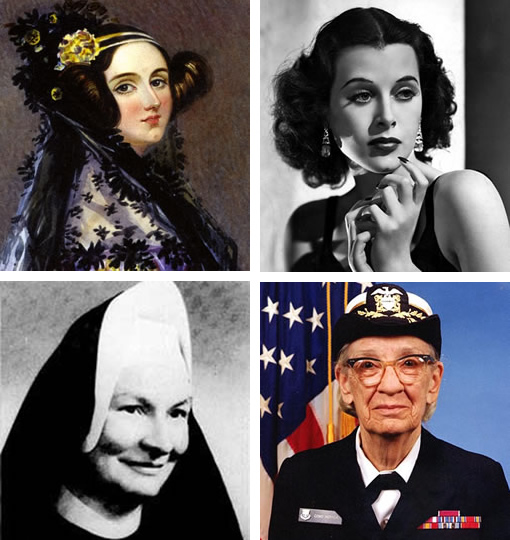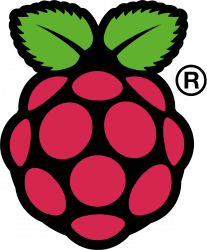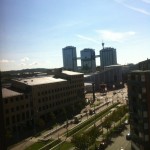Category Archives: Life Updates
2nd Annual Oxbridge Women in Computer Science Conference
I’ve just registered to attend the 2nd Annual Oxbridge Women in Computer Science Conference on 16th March 2015. I may presenting a poster or even giving talk. My submitted abstract is below:
Life on the Edge (Network)
The internet has abandoned the end-to-end principles on which it was established. With IPv4 addresses depleted, devices are left behind NATs and firewalls, with the transition to IPv6 yet to restore their public identity. Instead of dealing with complexity of the edge network, users opted to use centralized cloud services, offering usability and high availability.
In this post-snowden era, users are beginning to question their decision in fear of censorship and mass-surveillance. Furthermore, a series of highly publicized data branches and DDoS attack has shed light on the weak guarantees provided by opaque terms of service which are engineered to minimize legal responsibility. Many peer to peer applications such as multi player gaming and video conferencing need to low latency characteristics of edge network connections. Even in this modern world, users need the ability to establish inter-device connectivity without a full internet connection, for example to isolate local processing of personal data from the Internet Of Things or connecting between personal devices on the go.
In response to this demand, developers are building new applications for the edge network, they are reimplementing solutions to establishing authenticated identities, distributed consensus and availability in the face of mobile nodes, pervasive network partitioning, asymmetric channels and Byzantine failures. Without a clear stack and layer of abstraction, systems fail to provide even the most basic safety guarantees. Protocols are layered on of either other without formal agreement on the services provided at each layer. Even after this engineering effort by developers systems still require intricate configuration to deal with the diversity of devices, middleboxes and network environments on the edge network, if they are able to work at all. Developers made crude assumptions about their applications requirement e.g. assuming all application data needs the same level of consistency and fault tolerance.
We propose a new common abstraction between applications and the networked devices to form a personal cloud for every individual. Programmers (and ultimately users) formally specific the requirement for the data items, these requirements span domains in fault tolerance, replication, consistency, caching, accessibility, security levels and confidentiality. This foundation will enable us to develop new systems for handling personal data to finally put the individual back in control of their own data.
I would like to apply for both a talk and a poster on this topic. This topic is highly interdisciplinary both within and beyond computer science. Everyone (who uses the internet) will be able to relate to this topic and thus I think all the Oxbridge women will be able to take something away from this talk regardless of their particular field of computer science and stage of study. Whilst the talk will be of interest to a wider audience, the poster will focus on the proposed architecture of the system and the technical challenges of the working with the edge network.
Good morning from sunny Mumbai. I’m here for the 2015 ACM SIGPLAN Programming Languages Mentoring Workshop (PLMW) and will be bring PLMW straight to you with a live blog over at syslog.
The Countess, the Nun, the Rear Admiral and the Film Star
Some of the women at the computer lab (myself included) will be doing 2 minute madness this Sunday at 12:30 and 2:30 at this event at the Centre for Computing History

The Centre for Computing History is the venue for the Freudian Slips production which celebrates the considerable contribution of women to Computer Science.
The extraordinary Inter-Knit, created by artists Cathy Dunbar and Helen Judge, is the starting point of an exploration of the achievements of Ada Lovelace, Admiral Grace Hopper, Sister Mary Kenneth Keller and the unforgettable Hedy Lamarr. Events will be taking place on November 23rd.
Performances will be at 12 Noon, 2pm and 3pm and last for approximately 20 minutes.
There will also be ‘two minute madness’ presentations from women working in computing today as well as a photographic exhibition on Women in Computing from the CamIris Cambridge Women’s Photography Group.
Booking is not required, just come along on the day …
Date : 23rd November 2014
Time : 12 Noon, 2pm and 3pm
How to get a PhD
A 3 item reading list for new PhD students
How to get a PhD – recommended to me by a friend, I am around a third of the way through this book has greatly exceeded my expectations. Though not specific to computer science, it is specific to the british system which is vital.
So long, and thanks for the Ph.D.!
Matt Might grad school short articles – I have been a big Matt Might fan since his excellent talk at PLMV,
Off to ICFP 2014
I’m at the airport ready to set off to this years ICFP 2014 and it is set to be better than ever. Leo and I will be liveblogging over at syslog and I can’t to see you guys there.
ICFP & OCaml 2014
I am fortunate enough to attend ICFP, CUFP and OCaml2014 again this year. Like last year, I’ve been accepted as a student volunteer so I’ll be running up and down with a microphone in front of hundreds of people again. Jeremy is kindly maintaining a list of this years accepted papers. I can’t wait to see you all again.
Graduation & Raspberry Pi Internship
As of Wednesday, I officially hold a BA in Computer Scie nce. Now that the days of lectures and supervisions are up, I am in week 2 of 10, of an internship working on an education game for the Raspberry Pi.
nce. Now that the days of lectures and supervisions are up, I am in week 2 of 10, of an internship working on an education game for the Raspberry Pi.
Our open-world game teaches 11/12 years old python programming through a combination of guided challenges and independent exploration. Think Sonic Pi and the Sims, meets Minecraft Pi and Code Academy.
Heidi-ann
July 19, 2013
I am now officially 21 years old and also the owner of this cool, Wacom Bamboo Pen Graphics Tablet from Amazon

Wacom Bamboo Pen Graphics Tablet

